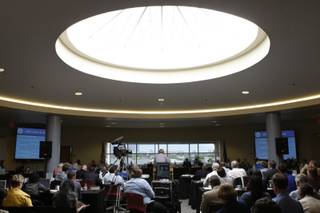
UNLV President David Ashley listens during a Board of Regents meeting at the Desert Research Institute Friday, June 19.
Saturday, June 20, 2009 | 2 a.m.
Sun Archives
- Online learning is higher education's growth track (4-19-2008)
- He's graduating, and didn't spend a day in class (3-25-2008)
- Cyberclasses short of seats (3-6-2006)
- College students making grade in online classrooms (7-26-2004)
Sun Coverage
Even as university system regents were consumed Friday by discussion about how to manage major budget cuts by the state in higher education, they took time to discuss how to increase student access to higher education — even though it might cost more.
Increasing the number of distance-learning courses — classes taken online from home or a remote classroom — could attract more students to the system and help those enrolled complete their programs more quickly, system administrators said.
At least a quarter of students in the state’s higher education system have taken at least one online course and some campuses offer entire degrees and certificates via the Internet.
The regents are interested in expanding the programs, even though they sometimes cost more than traditional courses.
“The most attainable and reasonable rationale for distance learning is access and success, not cost savings,” Vice Chancellor Jane Nichols said.
The Nevada System of Higher Education offers at least 50 degrees and six certificates that can be earned entirely online. Those courses are being taken not just by ranch kids in rural Nevada, but by National Guardsmen stationed in war zones, stay-at-home moms in North Las Vegas and working students who log on after a shift at a Las Vegas casino.
School administrators said students can graduate more quickly and cheaply because taking at least some of their courses online saves transportation and sometimes even textbook costs.
UNLV has seen enormous interest in its online courses, President David Ashley said. Last year the school offered about 30 percent more online courses to accommodate students pushed out by course reductions.
At a time when students are expecting significant tuition increases, any cost saving will likely help retention.
“Online courses are a way to accommodate students and to keep them on track,” Ashley said.
There could be some savings from further integrating the courses in the higher education system. Courses at all its institutions are supposed to be interchangeable. That means, at least theoretically, the system may not need a professor in each of two schools teaching the same course if the course can be taught online.
The engineering departments of some institutions are starting to share faculty in this way, Nichols said.
With online courses, campuses that are tight on space because of increased demand would be able to put off building new classrooms and would save on classroom maintenance.
But online courses require the same campus to pay people to develop and administer the programs, design the online infrastructure, keep the system up and running, and troubleshoot at remote locations where online courses are presented with live-streaming Webcasts.
And there may be additional costs to accommodate online students, such as for providing them online access to the library, counselors and services to address disabilities.
“It takes a lot to put that one course up,” Nichols said. “It’s a whole new way of teaching, a whole new way of getting course credit.”
Online courses won’t work for every class — imagine taking a basic biology class in your living room — but they are increasingly popular with students. If the system doesn’t continue to increase its online course offerings, Nevada could find itself high on yet another “worst in the nation” list.
“It’s a growing competitive environment,” Nichols said. “Everyone else is doing it. The public and students expect it. We have to do this to reach out to students and to meet their needs.”


Join the Discussion:
Check this out for a full explanation of our conversion to the LiveFyre commenting system and instructions on how to sign up for an account.
Full comments policy